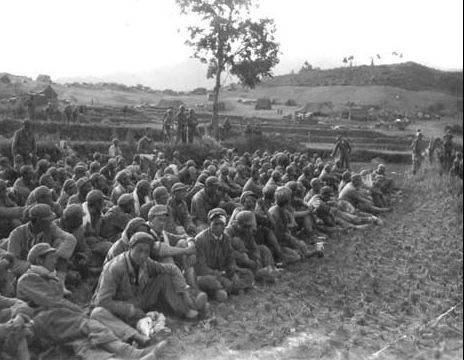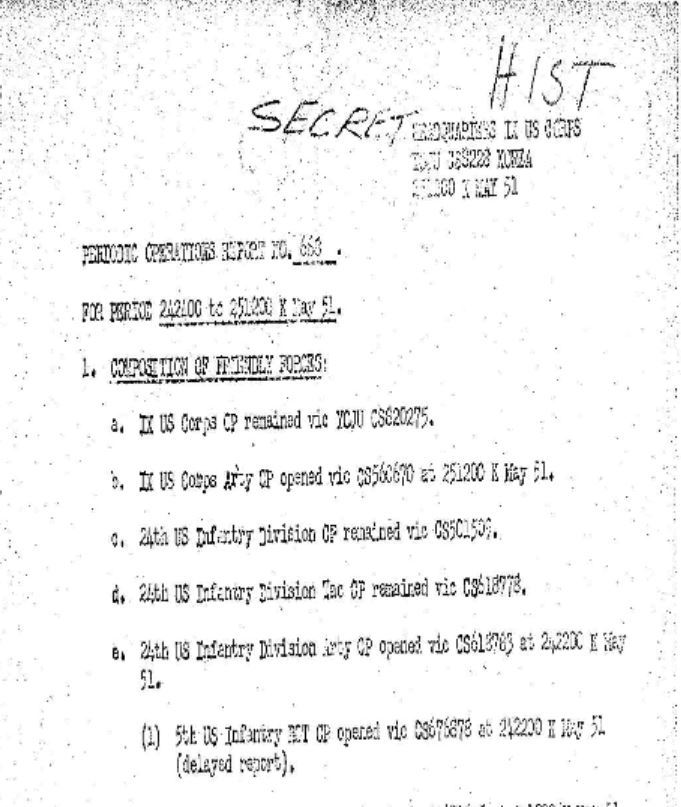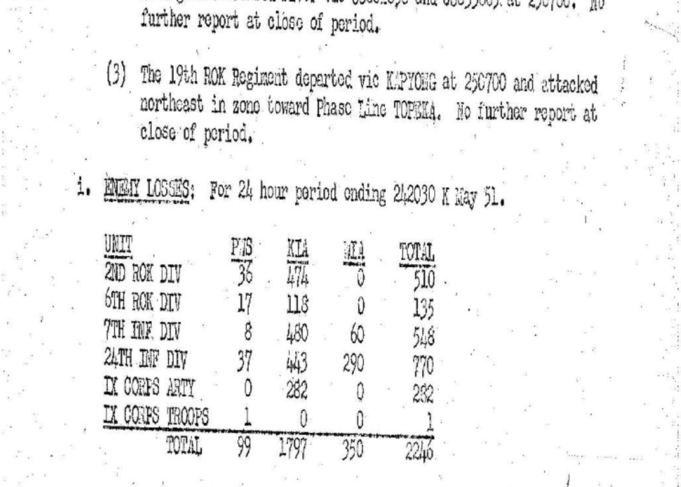Posted on : Jun.26,2018 17:52 KST
Modified on : Jun.26,2018 18:10 KST
 |
|
An image of Chinese POWs captured by US-led UN forces near Paro Lake, in Hwacheon County, Gangwon Province. (ROK government archives)
|
US military reports indicate over 24,000 were killed near Paro Lake
According to a newly released US army report, more than 24,000 Chinese soldiers were buried in Paro Lake (formerly known as Hwacheon Reservoir), located in Hwacheon County, Gangwon Province. South Korea-China friendship groups have argued that the remains of Chinese soldiers, who were also victims of the Korean War, should be quickly recovered and sent back to China. This should be approached from a humanitarian perspective, they say, just like the recent repatriation of the remains of American soldiers who died in North Korea during the Korean War.
According to the US Ninth Army Corps’ “Periodic Operations Report, No. 663” (issued in May 1951) that was made public by the South Korean Defense Ministry’s Institute for Military History on June 25, 24,141 Chinese troops were killed near Paro Lake between May 24 and 30, 1951. When these bodies are categorized into the reporting units, 13,383 were found by the ROK 6th Division, 772 by the ROK 2nd Division, 6,982 by the US 7th Division and 3,004 by the US 24th Division. But the records do not state how the bodies of more than 24,000 Chinese troops were disposed of. The US Ninth Army Corps had command of the UN forces that took part in the battle. This is the first time that the specific number of Chinese troops who died in this battle has been confirmed through official records.
 |
|
1
|
 |
|
A portion of the US Ninth Army Corps’ “Periodic Operations Report, No. 663” that was made public on June 25 by the South Korean Defense Ministry’s Institute for Military History. The report includes records of the number of deceased Chinese soldiers that were updated every 24 hours. According to the report, 24,141 Chinese troops were killed near Paro Lake between May 24 and 30, 1951. (US Ninth Army Corps website)
|
“Most of the 24,141 Chinese troops that were confirmed to have been killed by South Korean and American troops were presumably buried in Paro Lake. During the battle, Chinese troops were surrounded at Hwacheon Reservoir with no way out. According to the testimony of South Korean military personnel in the battle, a massive number of Chinese fell into the water,” said a researcher at the Institute for Military History. According to local rumors among villages around the lake, 30,000 Chinese troops were buried there.
A memorial stone erected at Paro Lake says, “After hearing about a great victory in which the Chinese 10th, 25th and 27th Armies had been buried in Hwacheon Reservoir, President Syngman Rhee visited the front line and delivered a handwritten work of calligraphy that said ‘Paro Lake.’ Since then, Hwacheon Reservoir has been called ‘Paro Lake.’” Paro Lake means “the lake where the barbarians were broken.”
Based on these records, South Korea-China friendship groups have argued that the remains of the Chinese soldiers buried at the lake should be recovered and repatriated and that a memorial should be set up in their honor. “How do you think that Chinese who never learned what happened to the husbands and sons sent to fight in another country’s war think about South Korea? Even though China was our enemy back then, it’s time to bury the hatchet and live in harmony,” said Heo Jang-hwan, who is co-president of the Korea-China International Friendship, Contact and Peace Promotion Society.
A group set up by the Defense Ministry to recover and identify war remains has currently found the remains of more than 12,000 soldiers in South Korea. Of the total remains, only 589 were Chinese and 700 were North Korean, with the rest belonging to South Korean soldiers. But according to Chinese statements at the time, more than 116,000 soldiers died in the war – a figure that rises to more than 145,000 when over 29,000 missing and prisoners are included.
As part of an agreement that South Korea and China reached in Dec. 2013, the remains of a total of 589 Chinese soldiers who died during the Korean War have been repatriated to China so far in five installments. 437 bodies were handed over for the first time in Mar. 2014, followed by 68 in Mar. 2015, 36 in Mar. 2016, 28 in Mar. 2017 and 20 in Mar. 2018. The repatriation of the remains of Chinese troops was carried out at the suggestion of former president Park Geun-hye during a state visit to China on June 2013.
By Park Soo-hyuk, Gangwon correspondent, and Park Byong-su, senior staff writer
Please direct all comments or questions to [english@hani.co.kr]











